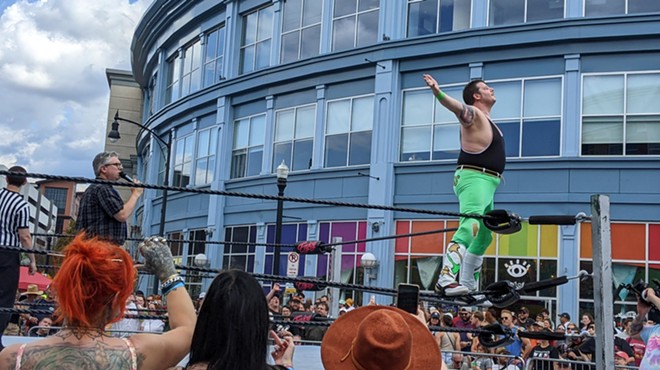In their new book, This Moment on Earth: Today's New Environmentalists and Their Vision for the Future (PublicAffairs), U.S. Sen. John Kerry and Heinz Foundations chair Teresa Heinz Kerry note that a trait of many "new environmentalists" is that they don't call themselves "environmentalists." At 254 pages, the book is a summary of environmental problems (from global warming to toxic consumer products), a gallery of committed activists, and a call to national and global action. Sen. Kerry (D-Mass), in 2004 the Democratic presidential nominee, spoke with CP from Washington, D.C.
Click here to listen to Kerry explain the importance of U.S. leadership on global warming. And click here to hear Kerry explain why nuclear power is not the answer to climate change.
Why do so many of the activists you profile not consider themselves environmentalists?
Some people have come to see [the term] in the pejorative, and we wanted them to see, "Wait a minute: You can do good things, and be smart about the environment, without worrying about whether you're an 'environmentalist' or not."
Many environmental books address personal choices, like what kind of light bulbs to buy. Why focus on activists?
We thought that would inspire people more than just saying, "You can do this, you can do that." Those kind of stories underscore that you as an individual can go out and make a difference. This book is meant to empower people.
Did you find it sobering how often regular citizens have fought just to get existing laws enforced?
It's incredible. And thank God for those patriotic citizens who do it. I mean, Rick Dove is one of my favorite stories in the book. Here's a guy who's 67 years old, he's been a Marine for a career. Two tours of duty in Vietnam. He earned the right to retire quietly. But he has felt compelled to continue to work for the country by being a Riverkeeper, and protecting the [Hudson] river.
What environmental role should the U.S. play globally?
We are the world's leading polluter. We contribute more global warming gasses than any other country. So if we're gonna urge other countries to help preserve the planet, and save us from the downsides of global climate change, then we've got to show good faith ourselves.
How likely is that when, as you point out, we haven't even raised automobile fuel-effiency (CAFE) standards since 1980?
That's one of the challenging questions. This afternoon [May 3] we will be having a hearing on CAFE standards, and next week we will have a bill that we're gonna mark up in the commerce committee, and I believe we're gonna pass it.
What about limiting greenhouse gasses with a "cap-and-trade" scheme for carbon emissions, as you propose?
We're in the middle of having meetings. We're working with colleagues, we're having businesspeople come in. My hope is that we're gonna pull this off. And we're going to do everything possible to do it.
Your book touts the business opportunities in green technologies. But doesn't the profit motive often crowd out environmental concerns?
I think people have woken up and there's a much higher level of sensitivity now, and awareness of downstream, unintended consequences. This issue of global climate change does not allow us a slide-off, because as the scientists are telling us, you've got about 10 years, or else.
Can the private sector be made more environmentally responsible?
I think the problem today is the marketplace doesn't reward the behavior that you want. It's because there's no value to it. What we do if we create a carbon cap is we've put a value on carbon, at which point there's a price, and emitting beyond your allowance costs you money, and [there's] an incentive to build up credits. So we're really trying to harness the marketplace rules.
Why do you favor carbon-dioxide "capture-and-storage" technologies, to sequester coal-plant emissions underground?
We've to to reduce our carbon footprint on earth. And the only way to reduce it, if you're going to produce some of it, is to capture it, and store it.
Aren't there problems with that technology -- like leaks?
We've had some hearings on it in the last weeks, and [scientists are] telling us that it's complicated. But they've done it: They know how to capture. They just haven't taken it to scale, in a plant. What we need to do is accelerate the taking-it-to-scale, immediately.
It'll cost. And we'll all have to pick up that [cost] in the price of the goods and the things we do. But today there's a cost, to not doing it, because we pick it up in the cost of the Superfund, the people who go to the hospital with lung problems, asthma attacks.
What about nuclear power?
We know there's a question with waste, and we know there's a problem with proliferation [of nuclear weapons]. But there's a bigger problem, which is just cost. It's gonna take us 10 years, at least, to build plants.
Now if we only have 10 years to get this job done, you can't look 10 years down the road to nuclear and say that's gonna solve the problem. We've got to stop emitting this carbon now. So we need "now" solutions, not 10 years from now. And the best thing we can do is start getting into these alternatives and renewables, and capturing and sequestering, and doing those things as rapidly as possible.
Teresa Heinz Kerry and John Kerry discuss and sign This Moment on Earth 2 p.m. Sat., May 12. Waterworks Barnes & Noble, Fox Chapel. Free. 412-781-2321














